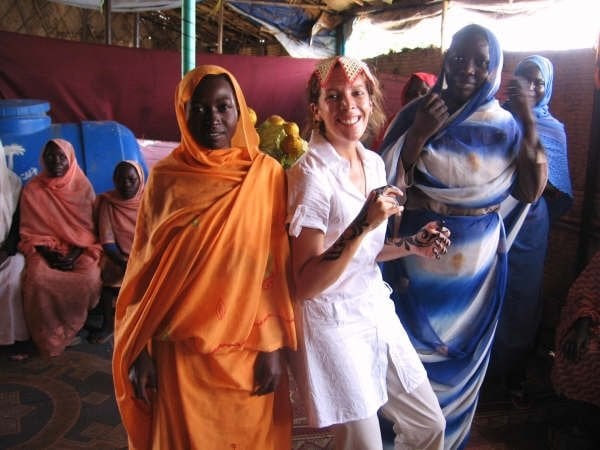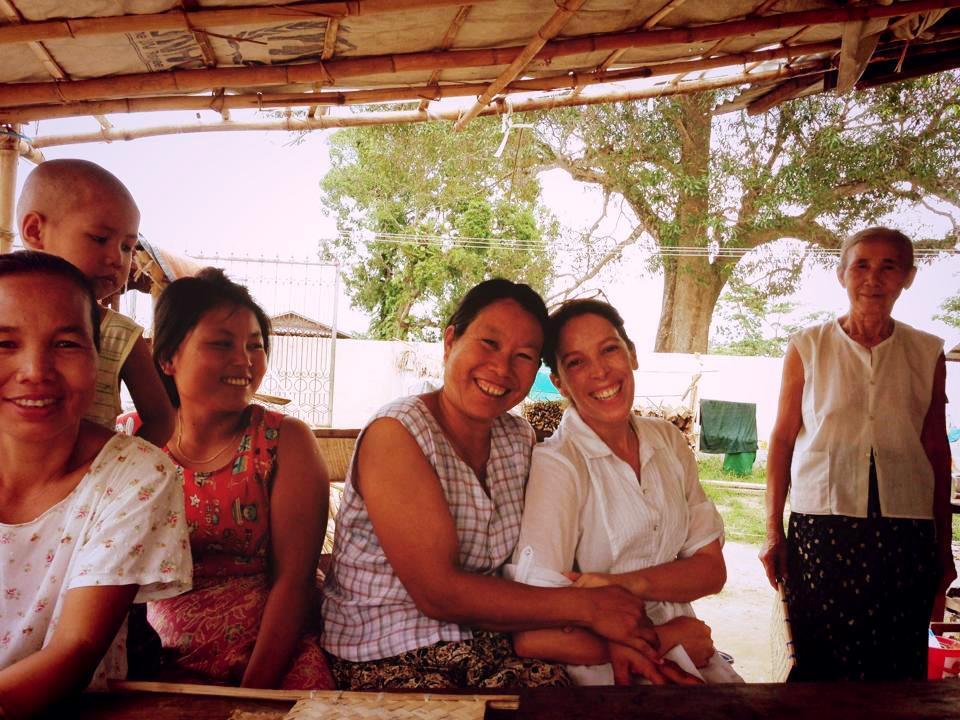Bangkok, Thailand – The Asia-Pacific Regional Office of the United Nations Population Fund, UNFPA, congratulates Devanna De la Puente for receiving the 2015 Marsh Award for Innovation in Peacemaking and Peacekeeping, in recognition of her vital work in preventing and responding to sexual and gender-based violence in the context of disasters and conflict in the region.
The award, made in association with Wilton Park, the renowned British forum for global change, was presented at a ceremony in Bangkok today by Mark Kent, British Ambassador to Thailand. Created in the United Kingdom by Brian Marsh OBE, Chairman of the Marsh Christian Trust, the Marsh Awards support and honour “extraordinary, unsung heroes”. The particular award bestowed on De la Puente, a Chilean national, recognizes an individual from outside the UK whose work makes an “innovative difference” to areas of conflict and peacemaking.
De la Puente plays a key coordination and response role as the Inter-agency Regional Emergency Gender-Based Violence (GBV) Advisor for Asia and the Pacific, based at the UNFPA Regional Office in Bangkok but also serving other UN agencies as part of the global protection cluster GBV area of responsibility (GBV AoR) and the Gender Standby Capacity (GenCap) project of the Norwegian Refugee Council (NRC).
Most recently, she led GBV prevention and response efforts for UNFPA and other partner organisations following Cyclone Pam in Vanuatu in March and the Nepal earthquake the following month. She was involved in other crisis contexts as well, including Super-Typhoon Haiyan in the Philippines, conflict and communal violence in Myanmar, and long-running conflict situations exacerbated by natural disasters in Pakistan and Afghanistan.
A conversation with Devanna De la Puente about her work and what it means to her:
How did you get into humanitarian work, including gender-based violence awareness and prevention, in the first place?
I always wanted to work in development and women’s rights even from a young age growing up in Chile, but initially didn’t know how to, so actually I studied Business Management as my first degree, and then my Masters in International Development in Italy. From there I did an internship with Action Aid in Bangladesh, working in the remote rural area of Kurigram on a women’s empowerment project. I just knew that is what I loved! I felt strongly driven to continue to promote women’s and girls’ rights, gender equality and to fight gender-based violence and to push for change.

While in Kurigram, I also started a project from my own initiative, in one of the villages where a high number of girls under 16 were already married and divorced, often when the husbands abandoned their wives if they didn’t provide more dowry. I realized something needed to happen, so I donated my internship daily allowance and we bought a cow, chickens and goats to first support their livelihoods. We organised the girls who formed their own group and earned an income from this activity. They also paid a community teacher to instruct them so they could return to school. We sensitised communities to remove the stigma against girls who had been divorced. After a few years some of the girls graduated as teachers and doctors, the project became entrenched as a programme of Action Aid which took it over for sustainability. This experience taught me at an early stage that change is always possible and that we always can and should at least try.
Since then I’ve continued working in this field in several countries, including going from Honduras with UNIFEM to the conflict in Darfur with Oxfam GB and the International Rescue Committee. Then, in the response to the Haiti earthquake, I got involved in gender-based violence coordination in emergencies working with UNFPA. I continued that work in Pakistan with UNFPA and UNICEF, and then came to Bangkok where I have been for the past four years working as Asia-Pacific Inter-agency Regional Advisor for the global protection cluster’s GBV area of responsibility (GBV AoR).
I love what I do. Although it is demanding and challenging, it is rewarding to know that I can contribute to change and that I can speak on behalf of so many countries, people and amazing women who are working every day to end gender-based violence and speaking out for women’s and girls’ rights.
You've worked across a range of humanitarian situations, in challenging circumstances. What is the most memorable or, at the risk of sounding clichéd, life-changing experience you've had?
It’s hard to identify just one, I’ve had many and each has been special. More than “life-changing experiences” there have been more what I call “Aha!” moments, where one word or person or event touches you in such a way just when you’re feeling overwhelmed by bureaucratic issues or super-tired from the work. All of a sudden it takes only that brief moment, that one second, to get you back to “This is why I love my job, this is what keeps me going and why I should continue to do what I do.”

For example, I was in Rakhine state in Myanmar just when the communal violence escalated back in early 2013. I was doing a focus group discussion with women, and although the intention was not to disclose personal information or specific cases, they opened up and told of some awful stories of rape and abuse as well as risks they were facing with their living conditions. Back then we had no GBV services at all for Rakhine, and the FGD ended with their question asking me “What are you going to do for us?” I had to be very clear on the limitations of my role, but I did tell them that I would raise their concerns with those who had a role to play to address their risks. After that I had more energy and strength to push it forward – these women represented the face of the work we were doing on GBV. As promised, I went and spoke to everyone from cluster coordinators to senior management to donors, to speak on their behalf and bring GBV and the risks they were facing to the table. We are very fortunate because now Myanmar has one of the largest GBV programmes in the region, and although the Rakhine situation remains very dire, a lot has been done to bring GBV high on the agenda and prioritize it not only in Rakhine but elsewhere in Myanmar where humanitarian crises occur.
My “Aha!” moments can also be happy moments, like when I visit a women-friendly space and laugh with the women there, or hearing a woman sharing a positive story of change in her life after receiving the services, or going back to a country after a few months and seeing the progress, and many more such examples.
Your current inter-agency position is based at UNFPA. From your candid point of view, how has UNFPA stepped up its response to gender-based violence in humanitarian crises in recent years -- what are the major accomplishments, and what are the challenges and gaps that remain to be addressed?
A lot has been done at UNFPA ever since I first started with them after the Haiti earthquake and then the Pakistan floods in 2010. Particularly for Asia-Pacific, given it’s the most disaster-prone region in the world, UNFPA in the region has improved the speed of response and made systems more efficient. UNFPA along with other actors has recently taken a strong stand globally and regionally on the prevention of GBV, incorporating it in the humanitarian agenda. More and more, UNFPA is becoming a key player in the protection of women and girls.
Some countries in the region have made great progress, such as the Philippines, Myanmar and, recently, Nepal in terms of prioritizing it in the UNFPA country offices, institutionalizing the agenda of GBV with government, and building the space for increasing capacity within countries. Gaps still remain as to resources, however. Addressing GBV requires technical capacity and without dedicated staff for GBV in emergencies, the response will always be incomplete, adding greater burden on the programme teams and not maintaining sustainability of the effort. That in my perspective and experience has been a great gap at the regional and country level. But progress is being made and efforts are in place to mobilise more resources to find adequate solutions to these challenges, and I hope it does promote positive change in the near future.


